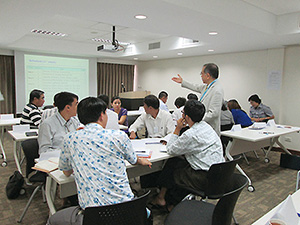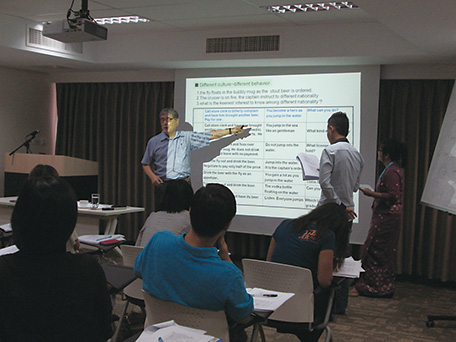Stories from the field 04
Next-generation human resources fostered by Japanese-style management and business
– The Myanmar-Japan Center for Human Resources Development

A Japanese lecturer instructing students to do group work on the subject of “Business Planning” at the Myanmar-Japan Center for Human Resources Development. (Photo: Myanmar-Japan Center for Human Resources Development)
The development of human resources is a key enabler for the economic development of any country. Myanmar is no exception. In Myanmar, the process of democratization and the shift to a market-oriented economy has accelerated ever since the change of government in 2011. Myanmar needs to secure and foster the next generation of human resources equipped with advanced knowledge and management know-how which can be used on an international level to support its economy. Therefore, government ministries, along with business and academic institutions outside of the government, have all been working to train future business leaders. However, the country still suffers from a shortage of teachers with significant business experience and educational materials with up-to-date information. Myanmar needs to improve the quality of its education and training.
It is against this backdrop that the Japanese government teamed up with Myanmar's Ministry of Commerce and the Union of Myanmar Federation of Chambers of Commerce and Industry (UMFCCI) in October 2013 to start a technical cooperation project, taking full advantage of the Myanmar-Japan Center for Human Resources Development (MJC). Prior to the start of that project, in August of that same year, the MJC was opened in the building of the UMFCCI in Yangon, the largest city of Myanmar. Being located in the same building as the UMFCCI, which unites 27,000 companies, the MJC is expected to operate effectively on the basis of an accurate and clear understanding of the needs of local industries in its activities.
While there are several universities and vocational colleges in Yangon where students can study business, the courses offered at these institutions tend to focus on theory rather than practice. These institutions do not always provide education that satisfies the needs of students and people in the workforce. To meet these needs, the MJC has developed a wide range of specialized business courses covering such topics as human resources management, knowledge management, marketing, entrepreneurship, and Japanese-style management and production. The instructors at the MJC are mainly Japanese nationals with hands-on experience as business consultants or instructors at other institutions sponsored by the Japanese government. Over 400 students participated in the business courses in FY 2014, bringing the total number of students enrolled at the MJC since its opening to over 1,100.
Among the students are many who actually work at companies that do business with Japan. There are also those who are interested in Japan and are thinking of doing business with Japan in the future. One of the former students, Mr. Hlaing Hlaing Oo, who is in charge of corporate planning for a company that sells tea and coffee from Myanmar, commented as follows:
“I wanted to learn how to enter new markets in an efficient and effective way. Therefore, I decided to take two courses, ‘Strategic Marketing' and ‘Business Plan Development.' I learned that we need to develop new business strategies whenever we want to sell a new product, provide a new service, or approach new customers. Up until now we have been doing things in the traditional way as a family run business. But by studying strategic marketing and the way that people think about business plans, I came to understand what we really need to do to improve and further develop our business. I hope to actively partner with companies from Japan as well as other countries in the future.”
Another former student is Mr. Htet Myet Lynn, a young executive still in his 20s, who works at a company that sells used cars imported from Japan. He commented, “When I previously researched the management techniques of Japanese companies, I learned that communication between management and employees generally goes very smoothly. That got me interested in Japanese-style management, and made me want to study it further. Through the courses, I came to realize the importance of developing a business plan that thoroughly analyzes the market before the start of a project. In the past, I had the mindset of ‘just trying things out.' I now feel that I was acting on a hit-or-miss basis. The market in Myanmar was opened up very recently, so there are many business opportunities here. Still, there are not many companies which are creating appropriate plans for their businesses. I hope to use what I have learned about Japanese-style management and business planning methods to expand my business throughout ASEAN, a region gearing up to become a major force in the world.”

A Japanese lecturer commenting on the presentation by the students of “Marketing” subject. (Photo: Myanmar-Japan Center for Human Resources Development)
Even after the end of the three year technical cooperation project sponsored by the Government of Japan, the MJC is expected to continue to promote the fostering of business leaders in Myanmar and to contribute to the economic development of the country, while developing a business environment conducive to Japanese companies expanding into the country's market. There are currently 175 Japanese member companies of the Japanese Chamber of Commerce and Industry, Yangon (as of the end of June 2014). The number of member companies in the organization has doubled in the last three years. Against this background, the MJC is becoming a hub for everything from human resources development to business exchanges, where people, knowledge, and technology gather, nurturing a solid foundation for the future development of Myanmar.
<< Previous Page Next Page >>
Main Text | Statictics and Reference Materials | Stories from the field | Master Techniques, From Japan to the World - | ODA Topics
